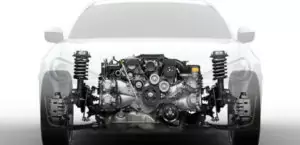The 2.0-liter Audi CVKB or A4 B9 2.0 TFSI turbo engine has been produced by the company since 2016 and is installed on such popular models of the German concern as the A4 or A5 in the B9 body. The motor belongs to the economical series of gen3b power units and operates on the Miller cycle.
The EA888 gen3b series includes: CZPA, CZPB, DKZA, CVKB, CYRB, CYRC.
Specifications
| Production years | since 2016 |
| Displacement, cc | 1984 |
| Fuel system | FSI + MPI |
| Power output, hp | 190 |
| Torque output, Nm | 320 |
| Cylinder block | cast iron R4 |
| Block head | aluminum 16v |
| Cylinder bore, mm | 82.5 |
| Piston stroke, mm | 92.8 |
| Compression ratio | 11.6 |
| Features | AVS on the intake |
| Hydraulic lifters | yes |
| Timing drive | chain |
| Phase regulator | on both shafts |
| Turbocharging | IHI IS20 |
| Recommended engine oil | 0W-20 |
| Engine oil capacity, liter | 5.7 |
| Fuel type | petrol |
| Euro standards | EURO 6 |
| Fuel consumption, L/100 km (for Audi A4 2017) — city — highway — combined |
6.4 4.3 5.1 |
| Engine lifespan, km | ~250 000 |
| Weight, kg | 132 |
The engine was installed on:
- Audi A4 B9 (8W) since 2015;
- Audi A5 2 (F5) in 2016 – 2018.
Disadvantages of the Audi CVKB engine
- While the motor has proven itself well and all the failures described below are single;
- On specialized forums there are complaints about low oil consumption from the first km of run;
- Closer to 120 – 150 thousand km, the timing chain is often stretched here and requires replacement;
- Other weaknesses of the engine include a plastic pump and an adjustable oil pump.






